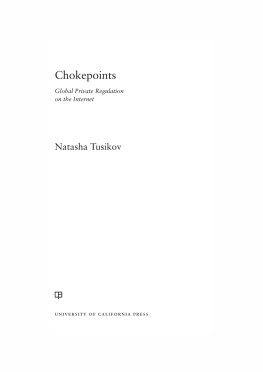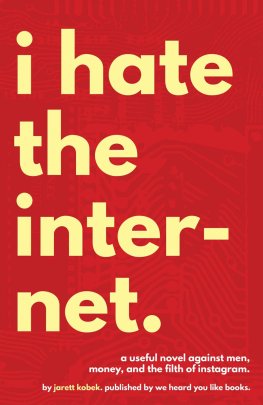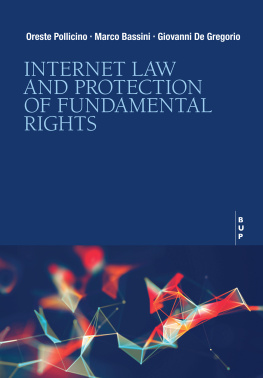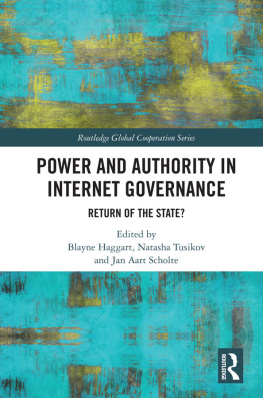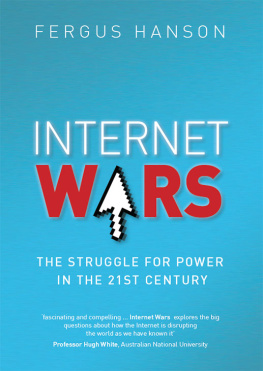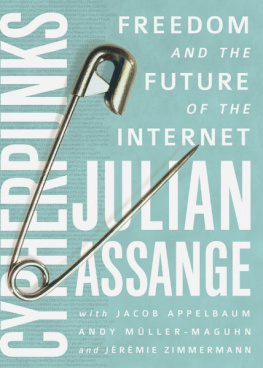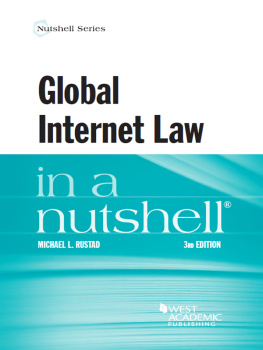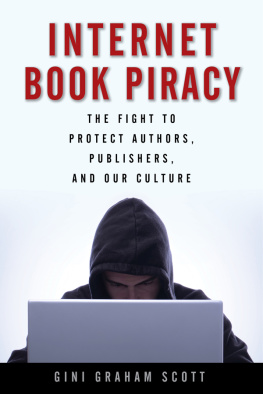Preface
During my research for this book, in early June 2013, Internet surveillance made headlines globally. Edward Snowden, a security contractor for the prominent U.S. defense contractor Booz Allen Hamilton, leaked highly classified files that revealed global surveillance programs operated by the U.S. National Security Agency and its allies. The Snowden files, as they are known, revealamong other thingshow the NSAs surveillance programs tapped into the U.S. telecommunications network, including the operations of Verizon, Sprint, and AT&T, to track and record phone communications.
Several NSA programs, with the colorful code names of Prism and Muscular, focused on obtaining information from popular U.S.-based Internet companies, particularly Google, Microsoft, and Yahoo. The NSA and its allies, particularly the United Kingdom, targeted these companies because they collect vast amounts of data from everyone who uses their services. The NSA obtained information from these services through secret court orders served to Internet firms from a previously little-known U.S. courtthe Foreign Intelligence Surveillance Courtand by covertly hacking into Internet firms systems (Greenwald 2014). Media coverage of the Snowden files sparked heated public debates around the world regarding government and corporate surveillance and the nature and limits of digital privacy.
NSA-style total surveillance is becoming ubiquitous in the modern world, and not just in national-security circles. Surveillance is the business model of the Internet, argues leading security analyst Bruce Schneier (Schneier 2013). Former U.S. vice president Al Gore critiqued the intensity of online surveillance in 2013, characterizing the Internet as a stalker economy where customers become products (Levine 2014). Given Gores past extensive involvement in Internet policy making and his vocal support for Internet issues, his criticism is potent.
Internet companies like Google, Microsoft, and Yahoo, along with Facebook and Twitter, provide services that are premised upon the collection and sharing of personal information and upon their users cultivating ever-expanding social and professional networks. These firms provide free search, email, chat and messaging, and social networking services in exchange for amassing, tracking, and monetizing users data. These troves of personal information are valuable not only to advertisers but also to state security agencies. By siphoning information from these firms, security agencies can track users digital footprints, including website browsing history, their personal social networks, and location data, as well as the actual content of emails, video calls, and text messages.
The Snowden files expose enmeshed, interdependent relationships between major U.S.-based Internet firms and the U.S. government. Some scholars term this dynamic an information-industrial complex (Powers and Jablonski 2015, 47). Internet firms with large, global operations, such as Google, PayPal, eBay, and Yahoo, have developed a considerable capacity to make and enforce rules for their services that can affect hundreds of millions of their users worldwide. The information-industrial complex is partly characterized by mutual interests in extending policies and standards that preference U.S. economic interests and further the countrys national security programs over the Internet through U.S. companies provision of information and communications technologies (Powers and Jablonski 2015). The U.S. government is interested in expanding its surveillance apparatus at the global level to maintain U.S. economic and military hegemony. In turn, large U.S. Internet companies like Google and Microsoft are interested in allying themselves with the U.S. government to further expand and entrench their businesses practices globally.
This book focuses on a parallel but largely unknown dimension of the information-industrial complex. It traces a series of secretly negotiated, handshake deals among small groups of elite corporate actors and government officials in the United States and Europe to counter, not terrorism, but the illicit online trade in counterfeit goods, from clothing and electronics to pharmaceuticals. Although the targets of the surveillance programs revealed by the Snowden files and these anticounterfeiting agreements obviously differ, the programs share several important commonalities in terms of actors involved and, most importantly, the methods they undertake to achieve their objectives. Several of the central actors discussed in the Snowden filesGoogle, Microsoft, Yahoo, the U.S. government, and the U.K. governmentare also key figures in the anticounterfeiting agreements. States and, increasingly, powerful corporations are turning to Internet companies that provide essential services to monitor online behavior and global flows of information. By regulating Google, the idea goes, one can regulate the Internet (Kohl 2013, 233). The agreements primarily benefit prominent, multinational intellectual-property owners like Nike, the pharmaceutical firm Pfizer, and the consumer care company Proctor & Gamble.
State-endorsed corporate mass surveillance on the Internet is a principal element of the anticounterfeiting agreements. As part of their duties under the informal agreements, Internet companies monitor how people use and interact with payment and advertising platforms, search engines, and marketplaces, in order to detect suspicious activities. These companies control and block flows of information and also disable websites selling counterfeit goods by withdrawing important commercial and technical services. The impetus for Internet companies expansive efforts as gatekeepers is coercive pressure from the U.S. and U.K. governments, which is fundamentally changing the companies regulatory responsibilities and the ways they identify and target problematic behavior.
Consequently, these anticounterfeiting processes, agreements, and methods are important not only in and of themselves but also for what they reveal about the nature of the emerging surveillance society and surveillance state. Who regulates the Internet, and how, are vitally important questions given its centrality to economic, social, and political life. Major Internet firms play principal roles in regulating flows of information on the Internet. They have considerable authority to decide what information people can access, use, and share, what items they can purchase and how, and the personal information users must divulge to Internet firms. Further, these companies also have significant discretion to determine the legality of certain types of content, such as the kinds of images that constitute child pornography or copyright infringement. These regulatory practices, however, have the potential to create surveillance dragnets that target and track millions of law-abiding Internet users. And, since Internet firms enforcement occurs outside of legislation or court orders, the firms are essentially unaccountable, and their efforts are largely opaque and prone to error.

